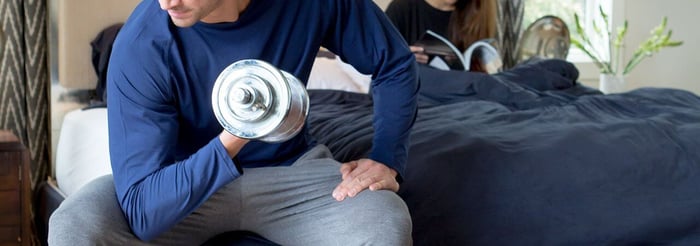We all know exercise provides a wealth of benefits, including improved cardiovascular health, increased lean muscle mass, and better endurance. However, what you do outside the gym — particularly how you sleep — is just as important to your overall wellness. Keep reading to learn more about the interconnected relationship between exercise and sleep.

Sleep = Better Workout
Whatever your goals are at the gym, they could be greatly hampered if you don't get the proper amount of sleep. This is because sleep helps restore your body's natural energy supply. It also allows you to recover and rebuild the muscles you worked on at the gym. If you don't give your body the fuel it needs, or the rest, your gym performance will suffer.
In one study looking at the effects of sleep deprivation on endurance runners, sleep-deprived participants covered 3% less distance than when they were well-rested. On the flip side, a study organized by the Stanford University Sleep Disorders Clinic and Research Laboratory followed much more well-rested athletes over a three-week period. These participants, who all increased their sleep, saw faster sprint times, longer endurance and lower heart rate.
How Working Out Helps You Sleep
If you've ever felt drained after a good workout, that exhaustion might attribute to a great night's sleep. A study reported that people who performed a moderately intense workout — e.g. riding a stationary bike or running on a treadmill — four times a week gained 75 extra minutes of sleep per night. These results might be due to a chemical reaction in the brain. Whenever you exercise, your brain releases adenosine, a chemical that makes you sleepy.
Routine exercise, especially in the morning and afternoon, may help establish a solid sleep-wake cycle. After working out, your body temperature rises a few degrees. Later in the day, your body temperature drops back down to normal, which helps spark drowsiness. It's even better if you exercise outdoors. The exposure of natural light is a key element in helping maintain your sleep-wake cycle.

Can I Exercise at Night?
As mentioned previously, working out in the morning or afternoon can lead to a good night's sleep. But what about exercising at night? Many sleep experts recommend not working out before bed because your body is too overstimulated to fall asleep right away. While this is possible, there have been more recent studies that suggest the effect of exercising before bed depends on the individual. One study reported that people who exercised before bed said they fell asleep faster and slept deeper with little to no sleep disturbances. Another study stated that people who performed a moderately intense workout at night eased their pre-bed anxiety. An evening workout may even reduce late-night cravings.
There's no one-size-fits-all solution, so you should experiment with your schedule and see what works best for you. You may find that doing a low-intensity workout, like yoga or Pilates, before bed might help you fall asleep. On the flip side, a high-intensity workout before bed might rev you up too much. Once you figure it out, stick to that routine to ensure your sleep-wake cycle stays on track. Exercise can contribute to a good night's sleep, but your bedding is another important factor to consider, too. That's why SHEEX Performance Bedding makes it easy to get the restorative sleep you need to perform at your best. Not only does it feel like activewear, but it also breathes 10x times better than traditional cotton, resulting in a deeper, cooler sleep.






